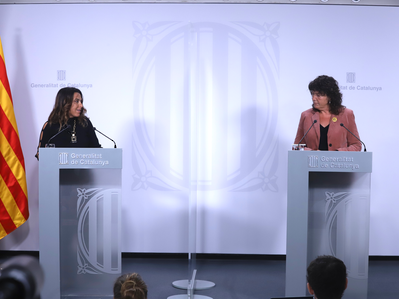- The chance comes along with 19 projects of about 5MW that have emerged very recently or that will soon be signed the resolution to go out to public information.
- The Executive Council has also approved the new Road Safety Plan 2021-2023, which aims to reduce fatalities by 15% in this three-year period.
- In addition, it has given the green light to a code of ethics defining the values that should guide the actions of public employees

The Executive Council has approved today to modify the Decree Law 16/2019, of November 26, on urgent measures for the climate emergency and the promotion of renewable energies, with the aim of introducing improvements to accelerate the implementation of wind and photovoltaic energy in Catalonia laying the foundations of a "country's own energy model, democratic and participatory and with territorial cohesion". This was explained by the Minister of Climate Action, Food and Rural Agenda, Teresa Jordà, in the appearance after the meeting of the Executive Council held in the morning, where she stressed that the intention is that this model is "transforming society and with a strong component of social empowerment".
The new text, which the Parliament must validate within a month, incorporates measures to order and balance the implementation of renewable energies, to minimize their social and territorial impact and also to facilitate the practice of self-consumption, both in the industrial field and in the field of multi-family residential buildings. This decree is the basis "for the creation of a public energy" and "the first piece to accelerate the energy transition in Catalonia" based on a new cleaner, more sustainable, fair and democratic energy model, which should facilitate compliance with the Law on Climate Change, according to which in 2030 renewable energies must account for 50% of the electrical energy consumed.
The change in the Decree Law is accompanied by 19 projects of around 5MW that have arisen very recently or that will soon be signed the resolution to go out to public information. They are located in regions such as Alt Penedès, Anoia, Bages, Baix Camp, Cuenca de Barberá, Garrotxa, Selva, Garrigues, Osona, Pallars Jussà, Pla d'Urgell, Segrià, Solsonès or Tarragonès, which represent the model that is to be promoted with this modification of the decree: installations that connect at medium voltage or are less than 5MW, consistent with a new distributed and democratic energy model.
In the coming months, the Government will deploy other initiatives that make up the roadmap presented last week by President Aragonès and Minister Jordà, such as the Network of Regional Energy Transition Offices, the Territorial Sector Plan for the Implementation of renewable energies, the Energy Transition Law and the creation of the public energy company.
The amendment of the Decree-Law includes the incorporation of measures and instruments to give priority to small and medium-sized renewable energy facilities, and to ensure that all wind and photovoltaic energy projects are developed with the agreement of the territory, so as to minimize their territorial and social impact. Thus, the new Decree-Law prioritizes the procedure for installations that connect at medium voltage or are less than 5 MW of power, and distribution grid managers will also be required to justify the refusal of connection to the grid up to 25 kV for these projects.
The new text also aims to promote self-consumption from renewable energies. Therefore, self-consumption facilities without surpluses will not require administrative authorization and can be installed by presenting only a declaration of responsibility. Likewise, the documentary burden required by electricity distributors and marketers to guarantee the compensation of surpluses from self-consumption facilities is reduced.
Other agreements of the Government
At this morning's meeting, the Executive Council has also approved the new Road Safety Plan 2021-2023, which, as explained by the spokesperson of the Government, Patrícia Plaja, sets "as its main objective to reduce by 15% the number of people killed on the road in the next 3 years and by 12% the number of injured people". The document, which is one of the concretions of the National Pact for Safe and Sustainable Mobility 2021-2030, organizes the set of measures, resources and actions necessary to reduce the online accident rate with the objectives set by the European Union. It is structured in the six strategic axes of the National Pact for Safe and Sustainable Mobility, which contemplate the need to rethink public space; adapt road safety policies; and create spaces for cooperation between the different sectors involved in intelligent mobility, among others. The axes are deployed in 223 actions and, for this year, almost 700 activities are programmed to promote safe and sustainable mobility as well as to reduce road accidents with victims.
At the weekly meeting, the Government also approved the Code of Ethics for public service in Catalonia, which "defines the values and principles that should guide and orient the actions of public servants in the exercise of their functions", explained Plaja. In this way, the code, which aims to be a general and transversal common ethical framework, wants to improve the democratic quality and the recovery of citizens' confidence in the institutions.
